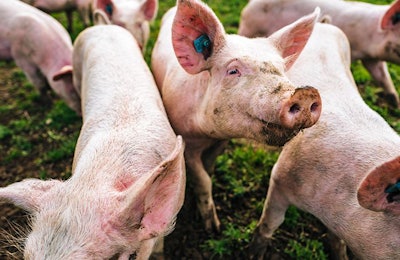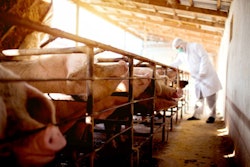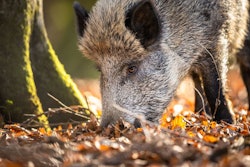
With confirmation of African swine fever (ASF) in a small herd in Brandenburg, Germany’s total outbreaks in domestic pigs since 2020 has risen to 8.
After two pigs in eastern Germany died at the end of last month, the authorities confirmed that the cause of death was African swine fever (ASF).
The animals belonged to a backyard herd of 11 animals in the Cottbus city district, according to the Brandenburg state government.
On suspicion of the infection, control measures were introduced. Furthermore, an investigation into the source of the virus was initiated.
According to the authority, there were three outbreaks — two in very small herds — among domestic pigs in Brandenburg in July 2021. These were followed by another outbreak at a farm 12 months later. These outbreaks were located in three different districts of the state.
The latest outbreak brings to eight the number of confirmed ASF outbreaks in domestic pigs in Germany since 2021. In addition to the five locations in Brandenburg, there have been cases at one farm in each of the states of Mecklenburg-West Pomerania and Lower Saxony, and in a backyard herd in Baden-Wurttemberg.
Just one week before the latest swine outbreak, the first cases of ASF in the Cottbus city district were reported. All these involved wild boar.
4 other European nations register new cases in domestic swine
So far in 2023, six countries in Europe have registered one of more outbreaks of ASF among farmed pigs so far this year. This is according to the latest update of the Animal Disease Information System of the European Commission (EC; dated March 3).
Along with Germany, Ukraine has also confirmed its first outbreak of 2023 with this system since the previous update dated February 18.
Recording the most outbreaks in this category is Romania, with 43 so far this year. Serbia’s total stands at 11, and Moldova’s is 10.
Further detail is provided by notifications from the national animal health agencies to the World Organisation for Animal Health (WOAH).
Involving a total of 151 pigs, the four latest outbreaks in Romania occurred in backyard animals in different counties.
In Ukraine, the first ASF cases have been detected in Dnipropetrovsk since the end of 2020. At the end of February, half of the 14 pigs in a backyard herd died in this region in the southeast of the country.
Meanwhile, in Moldova, both of the animals died at a premises in Edinet. A previous ASF outbreak wave in this northwestern district ended in August 2022.
ASF cases in European wild boar pass 2,200
Already this year, the total number of ASF outbreaks across Europe has reached 2,212, according to EC’s information system (as of March 3). Sixteen countries have registered one or more such outbreaks through this system since January 1.
Among the nations registering further cases in this population are Poland (747 outbreaks so far), Germany (408), Italy (195), Slovakia (175), Hungary (159) and Romania (147).
Also reporting new ASF outbreaks to the EC System since the previous update on February 18 were the Czech Republic, Estonia, Latvia, Lithuania, North Macedonia and Serbia.
Over the past 10 days, the veterinary authorities of six European states have registered with WOAH new ASF cases in wild boar. New cases were confirmed by Poland (134), Italy (65), Hungary (54), North Macedonia (15), Romania (8) and Latvia (1).
Since ASF was first detected in Germany in September 2020, total virus-positive cases in the country’s wild boar have reached 5,105. This is according to the national veterinary agency, the Friedrich-Loeffler Institute (as of March 3). The total includes 157 cases confirmed over the previous 28 days.
ASF developments in Russia
After a three-month hiatus, the ASF virus has been detected again in the Kostroma region. Nine wild boar found dead tested positive for the virus in early February, according to the latest WOAH notification.
Kostroma is located in Russia’s Central federal district of Russia, as is the Kursk region. Here, the veterinary authority reports the ASF situation “resolved” after 14 infected wild boar died in January.
To WOAH, the agency reports the same disease status for Krasnodar krai and the Saratov region.
In Krasnodar in the Southern federal district, one outbreak occurred in November, affecting a commercial farm with more than 20,600 pigs.
Over the 12 months from February 2022, seven ASF outbreaks were confirmed in Saratov in the Volga federal district. As well as one backyard herd of domestic pigs, a total of 39 wild boar were found to be infected with ASF during that time.
Developments in the ASF situation in Russia are not monitored by the EC’s animal disease system.
View our continuing coverage of the global African swine fever situation.

















